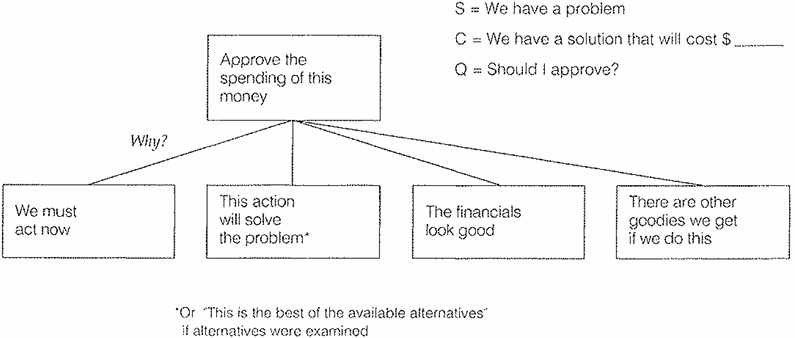
Seeking Approval to Spend Money
 المؤلف:
BARBARA MINTO
المؤلف:
BARBARA MINTO
 المصدر:
THE MINTO PYRAMID PRINCIPLE
المصدر:
THE MINTO PYRAMID PRINCIPLE
 الجزء والصفحة:
51-3
الجزء والصفحة:
51-3
 2024-09-11
2024-09-11
 909
909
Seeking Approval to Spend Money
Another very common memorandum type is one requesting approval to spend money. For those the reader's Question is always "Should I approve the request?", and here again the Question would be implied rather than stated
Requests for funds tend to be structured roughly as follows:
S = We have a problem
C = We have a solution that will cost$ ____
Q = (Should I approve?)
Or, to put meat on it:
S = As you know; work in our department has increased by 20% a year for each of the last 4 years. Nevertheless, in line with headquarters policy, we have kept the head count to just 14 people. The result has been overtime and week end work, plus a growing backlog.
C = The backlog has now reached 22 weeks, which the field is finding unacceptable, and we have no further scope for adding hours. Research has indicated that we can both cut the backlog and reduce the need for overtime working by installing an IBM ___ at a cost of $ ___
Q = (Should I approve?)
A = We urge your approval of this request.
In supporting a request for approval, there tend to be three, sometimes four, standard reasons used to defend the expenditure:
You should approve this request because:
- Resolution of the problem cannot wait
- This action will solve the problem (or this is the best way to solve the problem, if there are alternatives available)
- The cost will be more than offset by the projected savings (or some other form of financial justification)
- There are other goodies we can get.
The first point allows you to describe the problem in full detail, while the second point allows you to do the same for the solution. The third point covers normal financial analysis.
As for the fourth point, the facts do not always support this final statement, which might say something like, "It will create new opportunities for service". But if they do, you want to include them. In other words, you would not take the action for this reason, but as long as you are planning the action, you might as well point out this additional advantage.
Here, in rough concept, is how the pyramid would look.

 الاكثر قراءة في Writing
الاكثر قراءة في Writing
 اخر الاخبار
اخر الاخبار
اخبار العتبة العباسية المقدسة


